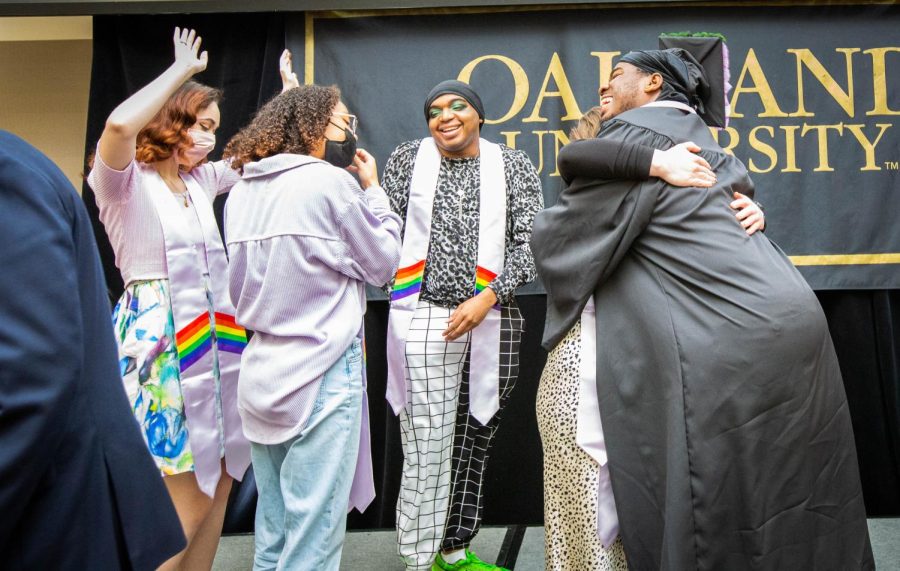OU deemed stand out LGBTQ-inclusive campus despite state challenges
Over 45% of LGBTQIA+ workers reported discrimination at work, including being fired, not hired or harassed for their sexual orientation or gender identity, according to a recent survey by the UCLA Williams Institute. Over half of the U.S. — including Michigan — does not protect the LGBTQIA+ community from discrimination.
In February, the Michigan Senate passed a bill to protect LGBTQIA+ Michiganders. Michigan currently ranks near the middle of the country for LGBTQIA-friendly laws and policies, and has seen similar bills stall in the legislature since 1983.
The vote was applauded by the Human Rights Campaign, but it could be reversed if it is not codified into law.
Despite Michigan’s struggle passing anti-discrimination legislation, Oakland University is one of just 44 colleges and universities in the U.S. to receive a five-star rating on Campus Pride Index.
The work from OU’s Gender and Sexuality Center and coordinator Blake Bonkowski is critical in OU’s rating.
Bonkowski said focusing on the areas the Campus Pride Index highlights were crucial in creating a large community and having support for people. These areas include trans-inclusive trained counseling staff, training on sexual orientation and gender identity issues, adopting a non-discrimination statement that includes “sexual orientation, gender identity and expression” and more.
“Us being at five stars allows us to take our foot a little bit away from that index in terms of where we look to for guidance,” Bonkowski said. “[We can] move into this new era of me being coordinator, and looking at what the students want us to do.”
This mentality reflects how OU has made progress historically — by listening to the university population.
“Before same-sex marriage was legal, there were faculty pushing to get same-sex partners rights,” Associate Professor of Sociology Heidi Lyons said. “I know there’s been some grassroots movements, particularly [with] being able to change your pronouns. [That] was really students feeling they had the power to make the change.”
Sometimes it is difficult to prove the policies make campus safer. While Bonkowski recognizes campus climate surveys and other data help, he also said part of the answer is being around students and listening to what they say.
Bonkowski also said looking at research from different yet similar areas is helpful.
For example, in states with protections in areas including employment, education and housing, research shows LGBTQIA+ individuals are less likely to report mental health issues like depression, anxiety, PTSD and experience improved overall physical health, according to the Center for American Progress. Research also indicates protections create higher levels of trust in the healthcare system among transgender patients, leading to decreased self-harm, alcohol consumption and especially suicidality.
The protections also benefit people who do not identify as LGBTQIA+.
Firms in states with employment protections had patenting rates 8%higher and patent citation rates 11%higher than firms in other states. Internationally, protections reinforce economic growth and improve health and labor markets. Plus, a 2019 study found that for every additional protection in a country, there was a $320 increase in GDP per capita for the countries studied.
While OU’s LGBTQIA+ resources have been praised and evidence shows similar strategies yield positive outcomes, some people who could benefit from them are left behind.
Bonkowski said affording college is a major roadblock for students. Whether it is not receiving financial assistance from their families or trying to balance money and jobs — Bonkowski says the latter problems are more prevalent in marginalized communities — LGBTQIA+ students cannot use OU’s resources if they are not enrolled.
Plus, even if an idea has total support, change can take time. The ability for individuals to change their preferred name originally faced challenges despite support.
“Everyone was supportive pretty much from the jump,” Bonkowski said. “The technology was a problem, and really, it was not our fault. We could have spent more money and got an advanced version of the system and fixed it.
“I understand why that felt like too much to ask to people at the time, [but] now it’s a standard feature of that software, so of course we have it and everybody’s glad that we do,” he said.
Another issue Lyons and Bonkowski mentioned that occurs everywhere is that, while policies can help, they do not stop discrimination. Even though Bonkowski said this is not a frequent issue at OU, Michigan still allows employers to fire workers “for a good reason, bad reason or no reason at all.”
While employers cannot fire employees discriminately, and even if LGBTQIA+ protections are codified into law, Bonkowski said employers can always say the employee was fired for another reason.
“Does [the bill] get rid of discrimination? Absolutely not — but I think what it does is it can reduce it,” Lyons said. “.”It also tells LGBTQ+ people that, ‘you’re valid, you belong here, we think you have skills, we want you to stay.’”








